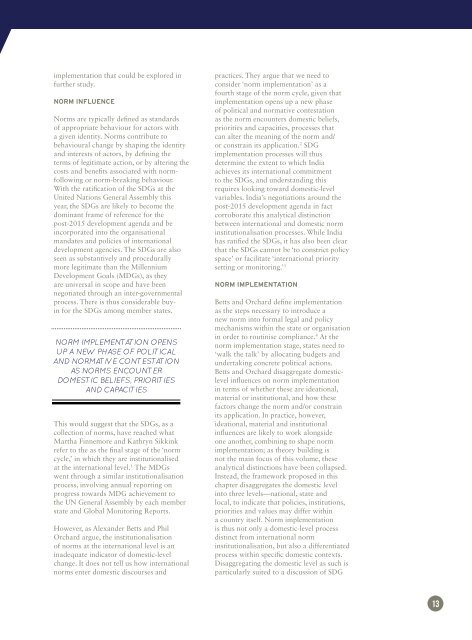Mathur Ritika Passi
zVAWsQ
zVAWsQ
Create successful ePaper yourself
Turn your PDF publications into a flip-book with our unique Google optimized e-Paper software.
implementation that could be explored in<br />
further study.<br />
Norm Influence<br />
Norms are typically defined as standards<br />
of appropriate behaviour for actors with<br />
a given identity. Norms contribute to<br />
behavioural change by shaping the identity<br />
and interests of actors, by defining the<br />
terms of legitimate action, or by altering the<br />
costs and benefits associated with normfollowing<br />
or norm-breaking behaviour.<br />
With the ratification of the SDGs at the<br />
United Nations General Assembly this<br />
year, the SDGs are likely to become the<br />
dominant frame of reference for the<br />
post-2015 development agenda and be<br />
incorporated into the organisational<br />
mandates and policies of international<br />
development agencies. The SDGs are also<br />
seen as substantively and procedurally<br />
more legitimate than the Millennium<br />
Development Goals (MDGs), as they<br />
are universal in scope and have been<br />
negotiated through an inter-governmental<br />
process. There is thus considerable buyin<br />
for the SDGs among member states.<br />
Norm implementation opens<br />
up a new phase of political<br />
and normative contestation<br />
as norms encounter<br />
domestic beliefs, priorities<br />
and capacities<br />
This would suggest that the SDGs, as a<br />
collection of norms, have reached what<br />
Martha Finnemore and Kathryn Sikkink<br />
refer to the as the final stage of the ‘norm<br />
cycle,’ in which they are institutionalised<br />
at the international level. 1 The MDGs<br />
went through a similar institutionalisation<br />
process, involving annual reporting on<br />
progress towards MDG achievement to<br />
the UN General Assembly by each member<br />
state and Global Monitoring Reports.<br />
However, as Alexander Betts and Phil<br />
Orchard argue, the institutionalisation<br />
of norms at the international level is an<br />
inadequate indicator of domestic-level<br />
change. It does not tell us how international<br />
norms enter domestic discourses and<br />
practices. They argue that we need to<br />
consider ‘norm implementation’ as a<br />
fourth stage of the norm cycle, given that<br />
implementation opens up a new phase<br />
of political and normative contestation<br />
as the norm encounters domestic beliefs,<br />
priorities and capacities, processes that<br />
can alter the meaning of the norm and/<br />
or constrain its application. 2 SDG<br />
implementation processes will thus<br />
determine the extent to which India<br />
achieves its international commitment<br />
to the SDGs, and understanding this<br />
requires looking toward domestic-level<br />
variables. India’s negotiations around the<br />
post-2015 development agenda in fact<br />
corroborate this analytical distinction<br />
between international and domestic norm<br />
institutionalisation processes. While India<br />
has ratified the SDGs, it has also been clear<br />
that the SDGs cannot be ‘to constrict policy<br />
space’ or facilitate ‘international priority<br />
setting or monitoring.’ 3<br />
Norm Implementation<br />
Betts and Orchard define implementation<br />
as the steps necessary to introduce a<br />
new norm into formal legal and policy<br />
mechanisms within the state or organisation<br />
in order to routinise compliance. 4 At the<br />
norm implementation stage, states need to<br />
‘walk the talk’ by allocating budgets and<br />
undertaking concrete political actions.<br />
Betts and Orchard disaggregate domesticlevel<br />
influences on norm implementation<br />
in terms of whether these are ideational,<br />
material or institutional, and how these<br />
factors change the norm and/or constrain<br />
its application. In practice, however,<br />
ideational, material and institutional<br />
influences are likely to work alongside<br />
one another, combining to shape norm<br />
implementation; as theory building is<br />
not the main focus of this volume, these<br />
analytical distinctions have been collapsed.<br />
Instead, the framework proposed in this<br />
chapter disaggregates the domestic level<br />
into three levels—national, state and<br />
local, to indicate that policies, institutions,<br />
priorities and values may differ within<br />
a country itself. Norm implementation<br />
is thus not only a domestic-level process<br />
distinct from international norm<br />
institutionalisation, but also a differentiated<br />
process within specific domestic contexts.<br />
Disaggregating the domestic level as such is<br />
particularly suited to a discussion of SDG<br />
13








